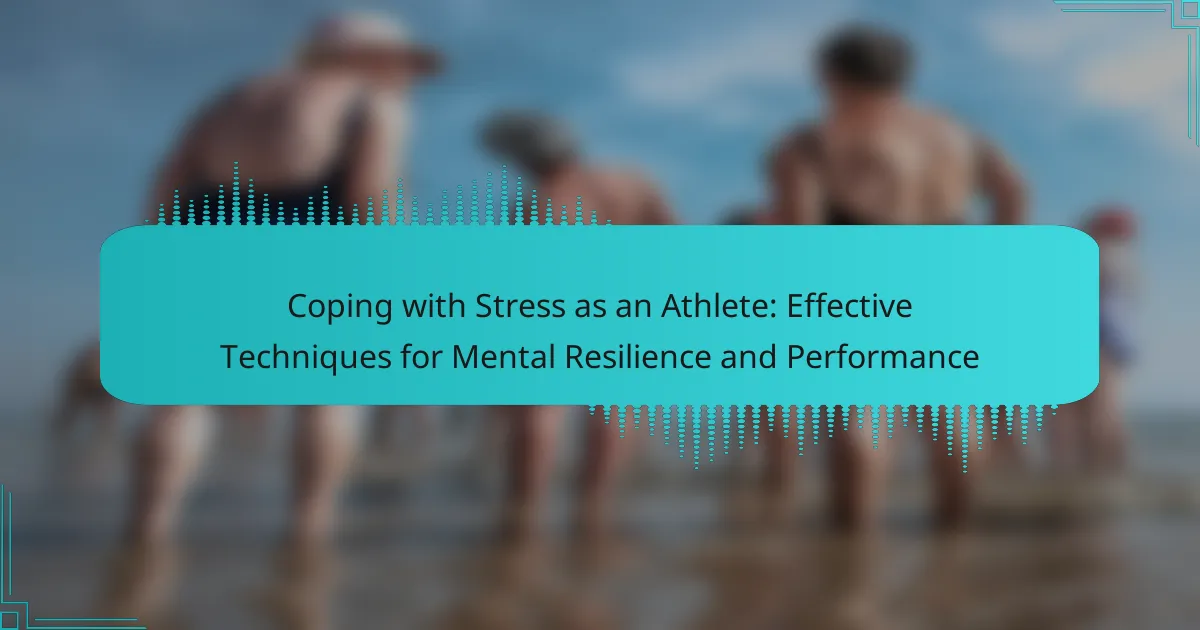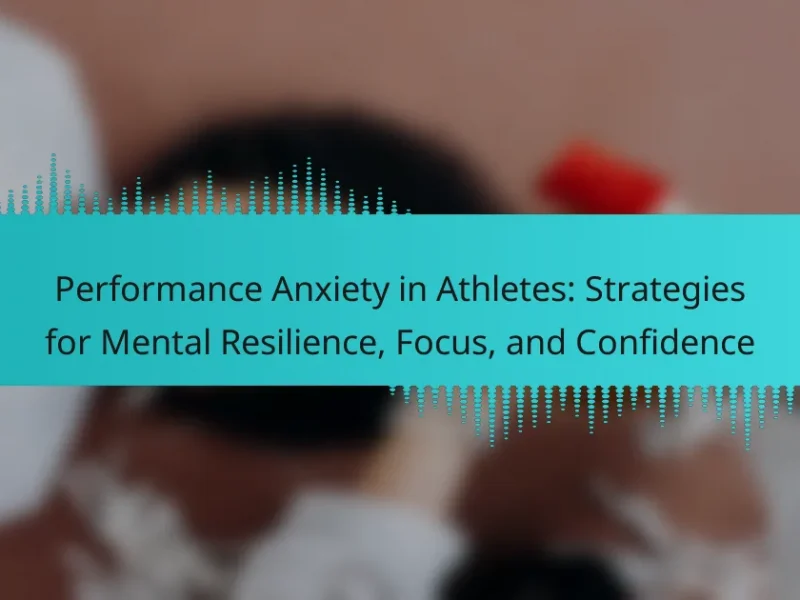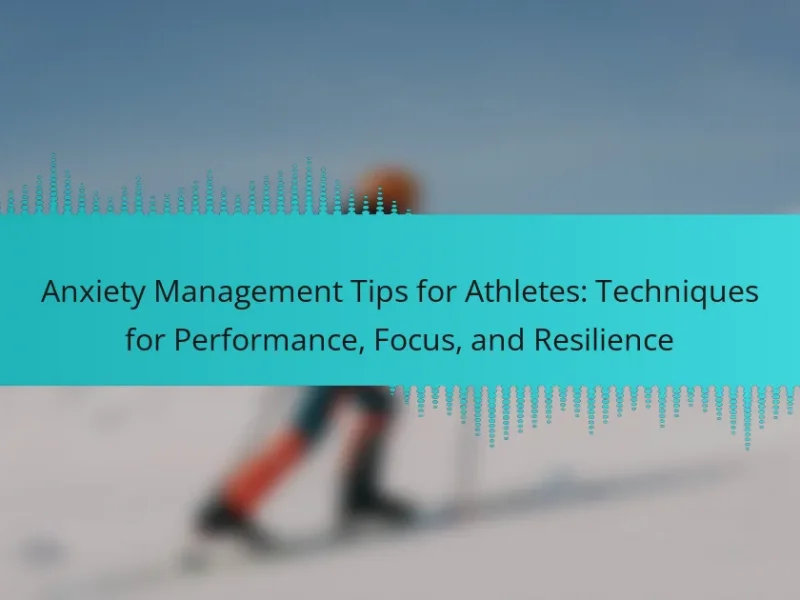Athletes often struggle with performance pressure, injury fears, and time management, which can hinder mental resilience and performance. Effective coping strategies include mindfulness techniques, physical activity, and structured routines. Unique methods like visualization and breathwork can further enhance mental strength. Recognising signs of emotional distress is crucial for timely intervention and support.
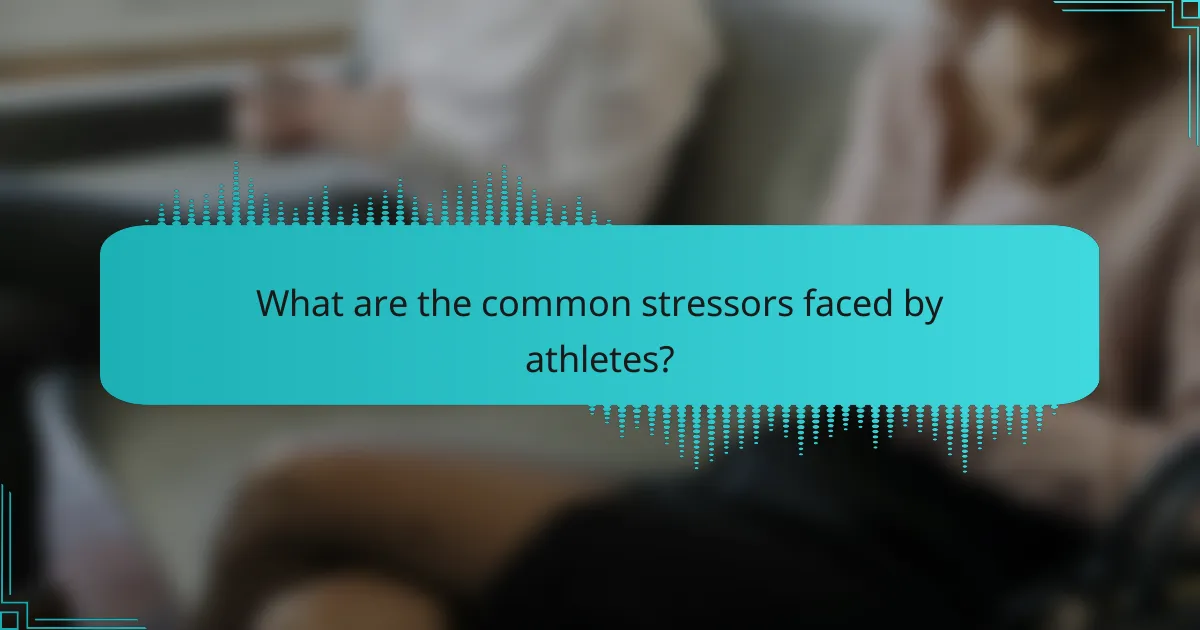
What are the common stressors faced by athletes?
Athletes commonly face stressors such as performance pressure, injury concerns, and time management challenges. These factors can significantly impact mental resilience and overall performance. Performance pressure arises from expectations to succeed, while injury concerns relate to the fear of setbacks. Time management challenges stem from balancing training, competition, and personal life. Addressing these stressors is crucial for maintaining mental health and enhancing athletic performance.
How does competition pressure affect mental health?
Competition pressure can significantly impact mental health, leading to stress and anxiety. Athletes often face high expectations, which can result in burnout if not managed properly. Effective coping techniques include mindfulness, visualization, and structured routines. These methods enhance mental resilience and improve performance under pressure. Athletes should prioritise mental health to maintain overall well-being and achieve peak performance.
What role does training intensity play in stress levels?
Training intensity significantly influences stress levels in athletes. Higher intensity workouts can elevate stress hormones, leading to increased anxiety and fatigue. However, moderate intensity can enhance resilience by promoting endorphin release, reducing perceived stress. Balancing training intensity is crucial for optimal mental performance and recovery.
How can external factors contribute to anxiety in athletes?
External factors significantly contribute to anxiety in athletes by creating pressure and uncertainty. These factors include competition expectations, media scrutiny, and social dynamics within teams. Athletes may feel overwhelmed by the need to perform consistently, which can lead to increased stress levels. Additionally, environmental conditions such as weather or venue can impact performance, further heightening anxiety. Understanding these influences helps athletes develop coping strategies to enhance mental resilience and maintain optimal performance under pressure.
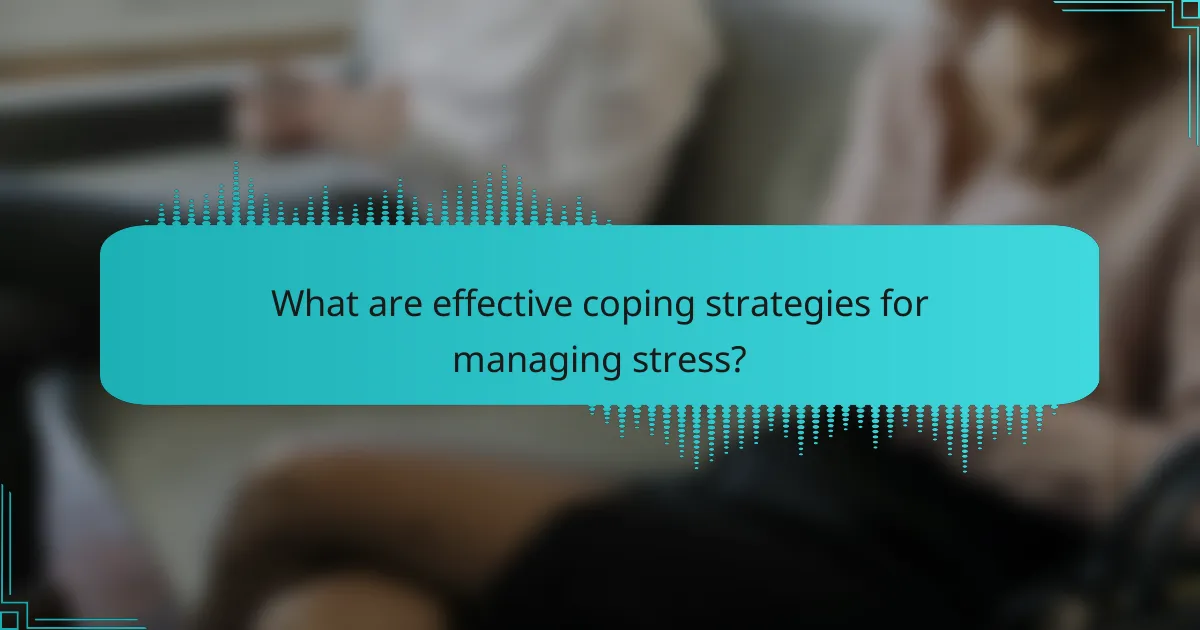
What are effective coping strategies for managing stress?
Effective coping strategies for managing stress include mindfulness techniques, physical activity, and structured routines. Athletes can enhance mental resilience through practices such as meditation, which improves focus and reduces anxiety. Engaging in regular exercise releases endorphins, promoting a positive mood. Additionally, establishing a consistent daily schedule helps athletes manage time effectively, reducing stress related to competition and training. Incorporating these techniques can significantly enhance performance and overall well-being.
How can visualization techniques improve performance under pressure?
Visualization techniques can significantly enhance performance under pressure by improving focus and reducing anxiety. These techniques allow athletes to mentally rehearse successful outcomes, creating a sense of familiarity and confidence. As a result, athletes can better manage stress and maintain composure during high-pressure situations. Research indicates that regular visualization practice can lead to improved reaction times and decision-making skills, which are crucial for peak performance.
What role does physical conditioning play in stress management?
Physical conditioning significantly enhances stress management for athletes by improving resilience and mental focus. Regular physical activity releases endorphins, which elevate mood and reduce anxiety. Additionally, structured conditioning routines develop discipline, fostering a sense of control that can mitigate stress. Research indicates that athletes who engage in consistent training report lower stress levels and better coping strategies during competitions. This unique attribute underscores the connection between physical fitness and mental well-being, making conditioning a vital component in an athlete’s stress management toolkit.
How can athletes utilize breathing exercises to reduce anxiety?
Athletes can effectively reduce anxiety through breathing exercises by promoting relaxation and focus. Techniques such as diaphragmatic breathing enhance oxygen flow, which calms the nervous system. Incorporating these exercises into training routines can improve mental resilience, allowing athletes to maintain peak performance under pressure. Regular practice can lead to a deeper sense of control and reduce performance-related stress.
What are the benefits of establishing a pre-competition routine?
Establishing a pre-competition routine enhances focus, reduces anxiety, and improves performance. Athletes benefit from consistent mental preparation, which fosters confidence and familiarity with competition conditions. A structured routine helps manage physiological responses to stress, leading to better emotional regulation. Research indicates that athletes who implement such routines report higher levels of mental resilience and overall satisfaction with their performance.
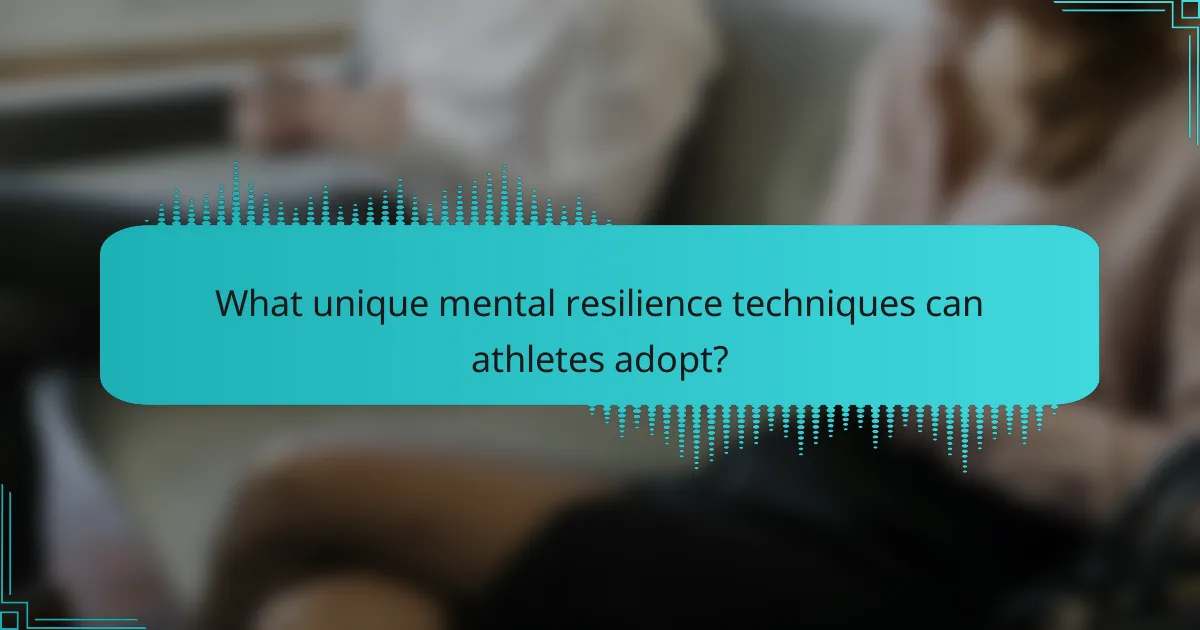
What unique mental resilience techniques can athletes adopt?
Athletes can adopt unique mental resilience techniques such as visualization, mindfulness, and positive self-talk. Visualization involves imagining successful performance scenarios, enhancing confidence. Mindfulness practices help athletes stay present, reducing anxiety. Positive self-talk reinforces motivation and focus, creating a constructive mindset. These techniques foster mental strength and improve overall performance.
How can mindfulness practices enhance focus and reduce anxiety?
Mindfulness practices enhance focus and reduce anxiety by promoting present-moment awareness and emotional regulation. Techniques such as meditation and deep breathing improve concentration and decrease stress responses. Research shows that athletes who integrate mindfulness report better performance and mental resilience. Regular practice can lead to significant reductions in anxiety levels, allowing for improved focus during competition.
What is the impact of journaling on an athlete’s mental health?
Journaling positively impacts an athlete’s mental health by providing a structured outlet for stress management. It fosters self-reflection, enhances emotional regulation, and improves focus. Research indicates that regular journaling can reduce anxiety levels by up to 30%, promoting mental resilience. This practice encourages athletes to process experiences, leading to better performance and overall well-being.
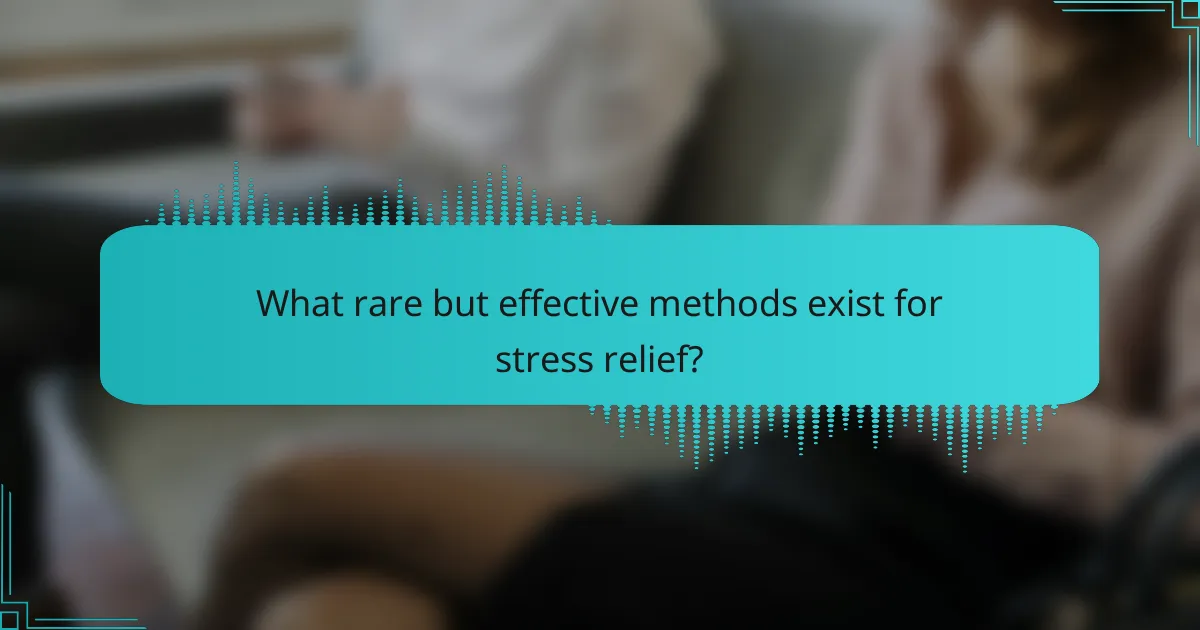
What rare but effective methods exist for stress relief?
Breathwork and visualization are rare but effective methods for stress relief in athletes. Breathwork techniques, such as diaphragmatic breathing, can enhance oxygen flow and reduce anxiety. Visualization involves mentally rehearsing successful performances, which can bolster confidence and focus. These methods foster mental resilience and improve overall performance.
How can engaging in creative activities help athletes cope?
Engaging in creative activities helps athletes cope by providing an outlet for stress and enhancing mental resilience. Creative expression, such as art or music, allows athletes to process emotions and experiences, reducing anxiety levels. Studies show that creativity stimulates the brain’s reward system, promoting feelings of joy and accomplishment. Additionally, creative activities can improve focus and cognitive flexibility, which are essential for optimal performance in sports.
What are the advantages of seeking mentorship in sports?
Seeking mentorship in sports offers athletes enhanced coping strategies, emotional support, and guidance for mental resilience. Mentors provide insights based on experience, fostering growth in performance under pressure. They help athletes develop unique stress management techniques tailored to individual needs, promoting overall well-being. This relationship can lead to increased confidence and improved decision-making during competitions.

What are the signs that an athlete needs professional help?
Athletes may need professional help when they exhibit signs of emotional distress, such as persistent anxiety or depression. Other indicators include a decline in performance, withdrawal from social interactions, and changes in sleep or appetite. Recognising these signs early can lead to timely intervention and support.
How can athletes identify when stress is becoming overwhelming?
Athletes can identify overwhelming stress through physical symptoms, emotional changes, and performance declines. Recognising signs like fatigue, irritability, or lack of focus is crucial. Monitoring these indicators allows athletes to implement coping strategies promptly. Regular self-assessment and communication with coaches can enhance awareness, fostering better mental resilience.
What resources are available for athletes struggling with anxiety?
Athletes struggling with anxiety can access various resources for support. Mental health professionals, such as sports psychologists, offer tailored strategies for managing anxiety. Support groups provide community and shared experiences. Online platforms offer self-help tools, including meditation apps and anxiety management courses. Additionally, educational workshops focus on mental resilience techniques. Regular physical activity and mindfulness practices also serve as effective coping mechanisms.
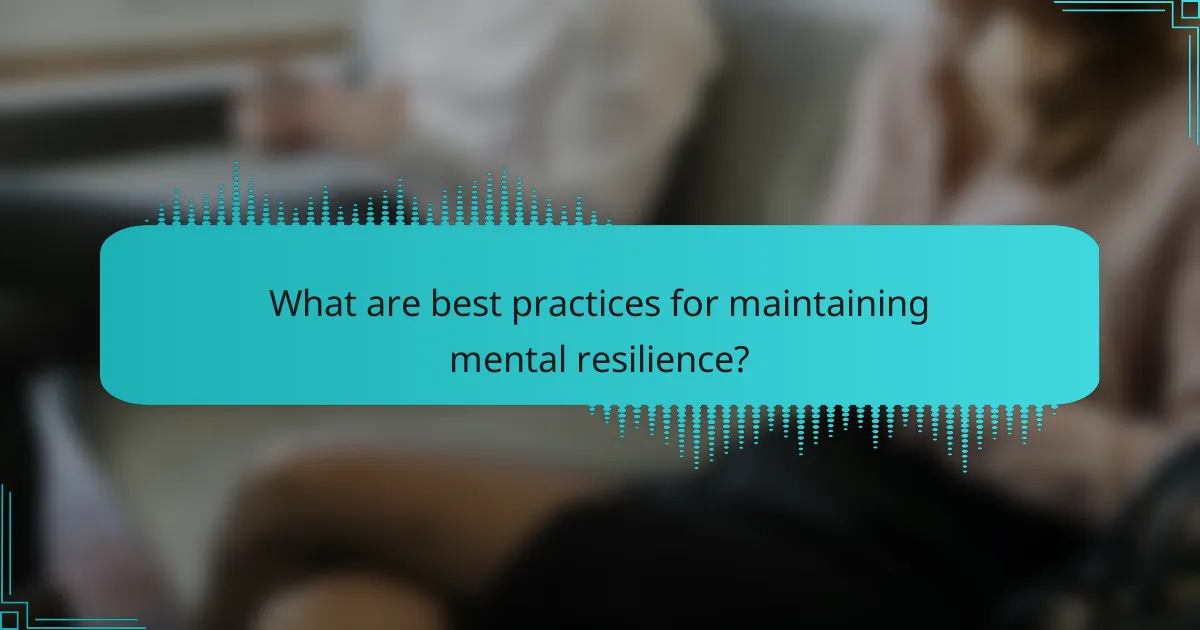
What are best practices for maintaining mental resilience?
To maintain mental resilience, athletes should adopt techniques that enhance coping with stress. Effective practices include mindfulness meditation, which improves focus and emotional regulation, and structured goal-setting, fostering motivation and clarity. Regular physical activity boosts mood and reduces anxiety. Additionally, maintaining a strong support network provides emotional resources during challenging times. Finally, developing a routine that incorporates rest and recovery is crucial for sustaining mental strength.
How can athletes create a supportive network for stress management?
Athletes can create a supportive network for stress management by building strong relationships with coaches, teammates, and mental health professionals. These connections foster open communication, accountability, and shared experiences, enhancing mental resilience. Engaging in group activities, sharing coping strategies, and participating in team-building exercises can strengthen bonds and provide emotional support. Regular check-ins and discussions about stress can normalise these challenges, making it easier for athletes to seek help when needed.
What are common mistakes athletes make in coping with stress?
Athletes often make mistakes in coping with stress by neglecting mental health, relying solely on physical training, and avoiding open communication. These errors can hinder performance and resilience.
One common mistake is underestimating the importance of mental recovery. Athletes may focus exclusively on physical aspects, ignoring techniques like mindfulness or visualization, which enhance mental strength.
Another frequent error is failing to seek support. Many athletes hesitate to discuss stress with coaches or teammates, leading to isolation and increased anxiety.
Lastly, athletes may set unrealistic expectations, creating unnecessary pressure. This can lead to burnout and decreased motivation. Recognising these pitfalls is crucial for developing effective coping strategies.
What expert insights can help athletes optimize their mental health strategies?
Athletes can enhance their mental health strategies by incorporating mindfulness, structured routines, and seeking professional support. Mindfulness practices, such as meditation, improve focus and reduce anxiety. Establishing consistent routines helps athletes manage stress effectively. Additionally, engaging with sports psychologists can provide tailored coping mechanisms and support systems.
